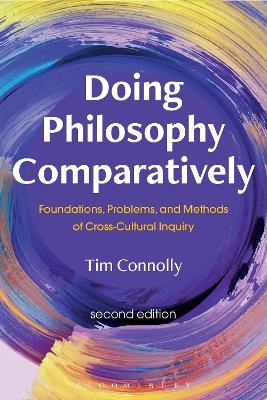
Doing Philosophy Comparatively
Bloomsbury Academic (Verlag)
978-1-350-17754-3 (ISBN)
Doing Philosophy Comparatively answers these questions by providing a thorough overview of the methodology involved in extending philosophy across linguistic and cultural boundaries.
Now revised and updated to showcase the most recent developments in the field, this second edition engages with philosophies beyond the Anglo-European tradition and features:
· Examples of cross-cultural philosophy from a wider range of non-Western traditions
· Methodological innovations from works of comparative philosophy published in the last decade
· Focused exercises for each chapter demonstrating how to interact meaningfully with primary texts and engage with recent debates in comparative philosophy
· Updated discussion questions and readings
Introducing the main problems, methods, and approaches of comparative philosophy, this new edition shows you how to make informed cross-cultural judgments through reflection and practice. It remains an essential toolkit for the practice of doing comparative philosophy.
Tim Connolly is Professor of the Department of Modern Languages, Philosophy, and Religion at East Stroudsburg University, USA.
List of Tables
Acknowledgements
Introduction
How this Book Works
Part I. The Nature of Comparative Philosophy
1. Is There Such a Thing as Comparative Philosophy?
The Legitimacy of “non-Western philosophy”
What is “philosophy” in comparative philosophy?
The “Comparative” Aspect
Conclusion
2. The Goals of Comparison
A First Look at the Two Dimensions
The Interpretive Dimension: Comparing to Understand
The Constructive Dimension: Comparing to Make
Philosophical Progress
Conclusion
3. The Role of Tradition and Culture
Tradition and Philosophy
Culture
Which Traditions?
Conclusion
Part II. The Problems of Comparative Philosophy
4. Linguistic Incommensurability
Background on the Term
The Linguistic Relativity Thesis
Understanding Other Languages
Issues for Comparative Philosophers
Conclusion
5. Foundational and Evaluative Incommensurability
Foundational Incommensurability
Evaluative Incommensurability
Conclusion
6. One-Sidedness
The Meaning of One-sidedness
Avoiding One-sidedness
Conclusion
7. Generalization
Cultural Essentialism
The Generalizations Debate
Generalizations and Evidence
Conclusion
Part III. Approaches to Comparison
8. Universalism
Varieties of Universalism
Challenges and Criticisms
Conclusion
9. Pluralism
The Case for Pluralism
Criticism and Evaluation
Conclusion
10. Consensus
Consensus in Theory and Practice
Evaluating the Consensus Approach
Conclusion
11. Global Philosophy
The Challenge of Global Philosophy
External Criticism
Global Problem-Solving
Conclusion
Part IV: The Practice of Comparative Philosophy
12. Study and Teaching Resources for Doing Philosophy Comparatively
Exercises
Suggested Readings
Further Questions for Discussion
Conclusion
Notes
Bibliography
Index
| Erscheinungsdatum | 16.01.2023 |
|---|---|
| Verlagsort | London |
| Sprache | englisch |
| Maße | 156 x 234 mm |
| Themenwelt | Geisteswissenschaften ► Philosophie ► Geschichte der Philosophie |
| Geisteswissenschaften ► Philosophie ► Östliche Philosophie | |
| Geisteswissenschaften ► Philosophie ► Philosophie der Neuzeit | |
| Geisteswissenschaften ► Religion / Theologie | |
| ISBN-10 | 1-350-17754-7 / 1350177547 |
| ISBN-13 | 978-1-350-17754-3 / 9781350177543 |
| Zustand | Neuware |
| Informationen gemäß Produktsicherheitsverordnung (GPSR) | |
| Haben Sie eine Frage zum Produkt? |
aus dem Bereich


